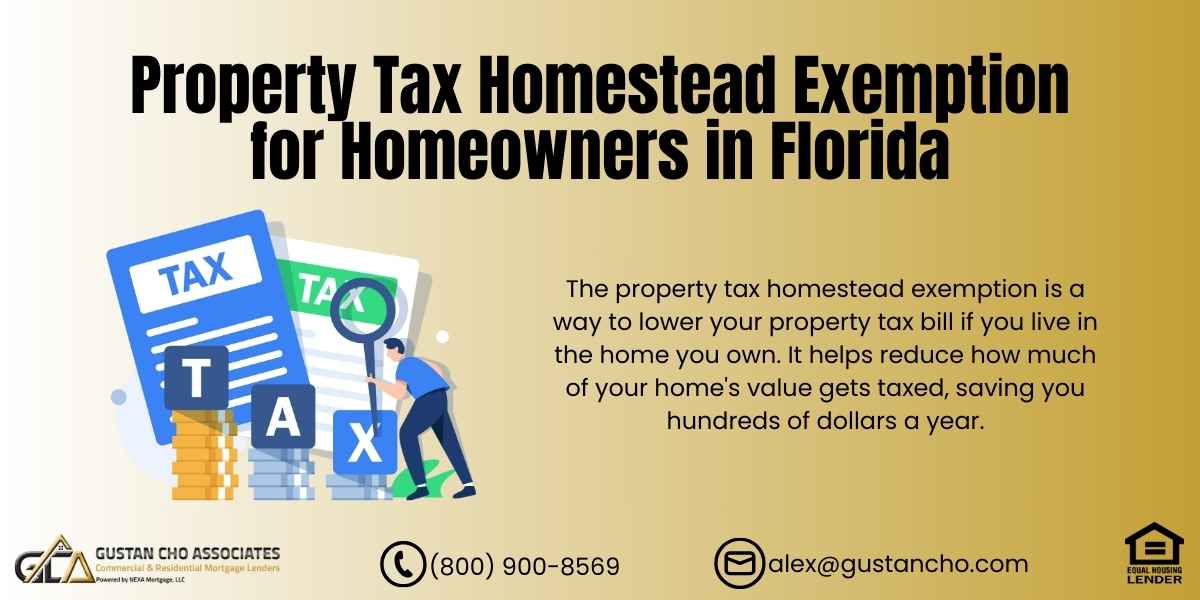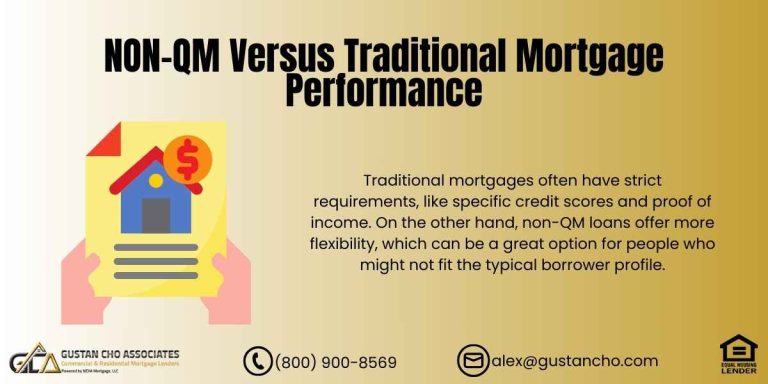Property Tax Homestead Exemption: Your 2025 Guide to Lowering Your Tax Bill and Buying a Home
If you’re a homeowner or planning to become one, you’ve probably heard about the property tax homestead exemption. But what is it? How does it work? And how can it help you save money and qualify for a mortgage?
Let us break it down for you in simple terms. This 2025 guide will walk you through everything you need to know about the property tax homestead exemption, who qualifies, how to apply, and how it can benefit you when working with lenders like Gustan Cho Associates.
What Is the Property Tax Homestead Exemption?
The property tax homestead exemption is a tax break that helps homeowners lower the amount they owe in property taxes. It’s designed to make it easier for people to afford to stay in their homes, especially if it’s their primary residence.
In Florida, the exemption can reduce the taxable value of your home by up to $50,000, which means you pay less in property taxes every year. That can save you hundreds of dollars annually—money that can go toward your mortgage or other bills.
Save on Property Taxes with the Homestead Exemption
Apply Now And Get recommendations From Loan Experts
Who Qualifies for the Property Tax Homestead Exemption in 2025?
To qualify in Florida:
- You must own and occupy the home as your primary residence.
- You must have established Florida residency by January 1st of the year you’re applying.
- You need to file your application by March 1st.
You must also be a U.S. citizen or have legal residency status. If you moved into your home recently, now is the time to file!
Even mobile homes, condos, and manufactured homes can qualify—as long as it’s your primary home.
What Documents Do You Need?
When you file for the property tax homestead exemption, you’ll need to prove:
- Verification of ownership (such as a deed or mortgage statement)
- Florida driver’s license or ID
- Florida vehicle registration
- Voter registration card (if applicable)
- Proof of residence, like utility bills or a bank statement
- If you’re not a U.S. citizen, immigration documents
This helps show that the home is your primary residence and that you live there as of January 1st.
How to Apply in 2025
Step-by-step:
- Go to your County Property Appraiser’s Office website.
- Fill out the Homestead Exemption Application (you can usually do this online).
- Submit all required documents.
- File before March 1st to get the exemption for that year.
Once approved, the property tax homestead exemption will show up on your tax bill for that year.
How Much Can You Save?
The property tax homestead exemption helps homeowners save money on their property taxes. Here’s how it works: the first $25,000 of your home’s value is exempt, so you don’t have to pay property taxes. Then, you don’t have to pay non-school property taxes for the next don’t00 of value (from $50,000 to $75,000). This means that if your home is worth $75,000 or more, you could save a lot of money each year—often between $500 to $1,000—depending on the tax rate in your area. This exemption can really help families keep more money in their pockets!
Bonus: Protection from Creditors
Did you know the property tax homestead exemption can also protect your home from being seized by most creditors in a financial crisis, bankruptcy, or lawsuit? Florida law makes your home “off-limits” to many types of collections.
This protection gives homeowners peace of mind—and lenders love to see stability when you’re applying for a mortgage.
Can You Transfer the Exemption?
Yes! Florida allows something called Portability. If you move to another primary residence within the same county or even a different county in Florida, you can transfer the savings from your old home to your new one.
You must apply for Portability within two years of selling your previous home. This can reduce the taxable value of your new home by up to $500,000!
Why Take Advantage of the Homestead Exemption?
Apply Now And Get recommendations From Loan Experts
Other Exemptions to Know About in 2025
If you don’t qualify for the standard property tax homestead exemption, or if you’re eligible for more, check out these additional exemptions in Florida:
1. Senior Low-Income Exemption
The Senior Low-Income ExemptionS is designed for homeowners aged 65 and older who have resided in their homes for at least 25 years. To be eligible for this exemption, applicants must adhere to certain income restrictions, with an annual income ceiling established at $35,167 for 2024. This program aims to provide financial relief to long-term homeowners facing economic challenges.
2. Disabled Veteran’s Exemption
The Disabled Veteran’s Exemption offers significant financial relief for veterans who are aged 65 and older and have suffered partial or full disabilities due to combat-related injuries. This exemption can provide a full waiver of certain taxes, easing the financial burden for those who have sacrificed so much in service to their country. By meeting the criteria for this exemption, qualifying veterans can experience improved financial security in their retirement, enabling them to prioritize their health and overall quality of life.
3. Deployed Military Exemption
The Deployed Military Exemption allows military members to receive tax benefits based on the number of days they are deployed outside the United States during the tax year. The exemption percentage corresponds directly to the duration of their deployment, providing financial relief proportional to the time spent away from their home station. This ensures that military personnel can benefit from the tax relief as a recognition of their service and sacrifices while stationed abroad.
4. Surviving Spouse of First Responders
If your spouse was a first responder who tragically lost their life while on duty, you might be eligible for a complete exemption from certain obligations. This provision aims to support surviving spouses during a challenging time, acknowledging the sacrifice made by their partners in service to the community. It’s important for those affected to explore the specific benefits available under this exemption to ensure they receive the support they deserve.
5. Parent/Grandparent Add-On Housing
The Parent/Grandparent Add-On Housing program is intended for homeowners who have built a mother-in-law suite to provide living space for a senior relative. If you qualify under this requirement, you can seek financial assistance by completing the Assessment Reduction Application. This initiative not only supports families in providing suitable living arrangements for their loved ones but also aims to alleviate some of the financial burdens associated with property assessments related to such additions.
These options can add significant savings and may stack with your main homestead exemption.
Why This Matters for Getting a Mortgage
At Gustan Cho Associates, we help buyers daily who don’t realize how much the property tax homestead exemption can impact their monthly mortgage payment.
Lower property taxes = lower escrow payments = lower monthly mortgage bills.
When we calculate your debt-to-income ratio, lower taxes can help you qualify for a larger home or get approved more easily. Every dollar counts—especially when you’re buying your first home or trying to refinance.
We also work with buyers who want to use the portability feature to keep their property tax base low when upgrading to a new home.
Most Common Mistakes to Avoid
- Missing the March 1st deadline
- Applying late in the year (you must be living in the home on January 1st!)
- Assuming your exemption transfers automatically to a new home
- Not updating your address with DMV, bank, and voter records
Don’t lose out on this money-saving opportunity due to paperwork mistakes!
Need Help? Gustan Cho Associates Is Here for You
Whether buying your first home, relocating, or refinancing, understanding the property tax homestead exemption is key to saving money and getting mortgage approval.
At Gustan Cho Associates, we specialize in helping buyers get approved without lender overlays—even with low credit scores, high DTI, or unique situations.
We’ll help you:
- Plan for your property tax payments
- Understand how exemptions affect your monthly costs
- Connect you with local professionals to file for your exemption on time
Final Thoughts
The property tax homestead exemption isn’t just a tax perk—it’s a smart financial move. It protects your home, saves you money yearly, and can help you qualify for a better mortgage.
Make sure you apply before March 1st and understand what extra exemptions you may be eligible for. If you’re ready to buy or refinance in 2025, reach out to the experts at Gustan Cho Associates—we’re here to help you every step of the way.
Need Help Getting a Mortgage with Low Property Taxes?
Contact Gustan Cho Associates today at 800-900-8569, text us for a faster response, or email gcho@gustancho.com and see how the property tax homestead exemption can boost your buying power. The team at Gustan Cho Associates is available 7 days a week, on evenings, weekends, and holidays.
Are you eligible for a Homestead Exemption?
Apply Now And Get recommendations From Loan Experts
Frequently Asked Questions About Property Tax Homestead Exemption:
Q: What is a Property Tax Homestead Exemption, and How Does it Help Me?
A: The property tax homestead exemption is a way to lower your property tax bill if you live in the home you own. It helps reduce how much of your home’s value gets taxed, saving you hundreds of dollars a year.
Q: How do I Know if I Qualify for the Property Tax Homestead Exemption?
A: To qualify, you must live in the home as your primary residence on January 1st, have Florida residency, and file by March 1st. You’ll also need a Florida ID and proof you live there.
Q: What Documents do I Need to Apply for the Property Tax Homestead Exemption?
A: You’ll need proof of ownership, a Florida driver’s license, vehicle registration, and possibly a voter card or utility bill to show the home is your primary residence.
Q: When is the Deadline to Apply for the Property Tax Homestead Exemption in 2025?
A: You must apply by March 1st, 2025. If you miss it, you’ll lose the savings for the whole year.
Q: How Much Money Can the Property Tax Homestead Exemption Save Me?
A: Most people save between $500 to $1,000 a year, depending on their home value and local tax rates. That’s money you can put toward your mortgage or other bills.
Q: Can I Still Get the Property Tax Homestead Exemption if I Live in a Mobile Home or Condo?
A: Yes! As long as it’s your primary home, even a mobile home, condo, or manufactured home can qualify for the property tax homestead exemption.
Q: Does the Property Tax Homestead Exemption Help Me Qualify for a Mortgage?
A: Yes! Lower property taxes mean a smaller monthly mortgage payment. That helps you qualify for more homes or get approved more easily—especially with lenders like Gustan Cho Associates.
Q: What is Portability, and How Does it Relate to the Property Tax Homestead Exemption?
A: Portability lets you move your tax savings from one home to another in Florida. You must apply within 2 years after selling your old home. It can lower your new home’s tax bill, too.
Q: Can the Property Tax Homestead Exemption Protect My Home From Creditors?
A: Yes, in Florida, it can help protect your home from being taken by most creditors during challenging times like bankruptcy or lawsuits.
Q: What are the Most Common Mistakes When Applying for the Property Tax Homestead Exemption?
A: People often miss the March 1st deadline, forget to update their address, or assume the exemption moves to a new home automatically—it doesn’t. You have to reapply each time.
This blog about “Property Tax Homestead Exemption For Homeowners in Florida” was updated on March 27th, 2025.
We’ll help you understand the eligibility requirements and guide you through the application process
Apply Now And Get recommendations From Loan Experts










